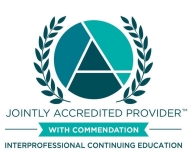Series Description:
This educational activity is designed to incorporate evidence-based pathophysiology, diagnosis, and/or treatment of surgical disorders into clinical practice. Speakers will utilize their personal, institutional, and evidence-based experience to address patient health care conditions requiring clinical and surgical treatment. Speakers will also utilize departmental quality improvement data, M&M data, and patient safety data to improve outcomes of surgical disease and other aspects of surgical patients’ general health. Evidence-based data regarding the changing aspects/newer approaches to surgical disease will be analyzed, and critical issues related to surgery within the broader scope of health care will be discussed. There are varying degrees to individuals’ knowledge regarding clinical and surgical treatments. While individuals may be aware of varied treatments within the surgeons’ armamentarium it is beneficial to address the topics from an evidence-based approach. Learners should both have the knowledge base and be able to apply this knowledge into their practice. Grand Rounds will address each of these shortcomings by utilizing experienced surgical experts in the field. Each month will provide diverse information pertaining to these issues.
Target Audience:
Physicians (MD or DO)
Other Healthcare Professionals
Learning Objectives:
Upon completion of this learning activity, participants should be able to:
1.) Associate the pathophysiology, diagnosis, and/or treatment of surgical disorders using scientific data and reports.
2.) Identify innovative surgical techniques to manage surgical conditions.
3.) Identify other professionals’ clinical experience with surgical conditions including clinical management, multidisciplinary care and clinical outcomes.
4.) Assess cutting-edge surgical ideas grounded in evidenced-based medicine that will impact local/regional practice patterns with the goal of improved patient outcomes.
Providing Culturally Appropriate Care which is Free of Implicit Biases (AB 1195 & 241):
Learners are strongly encouraged to engage in self-directed learning related to the impact of implicit biases in this clinical area via the references provided below:
Social Determinants of Health
- Pollak, Y. L. E., Lee, J. Y., Khalid, S. I., Aquina, C. T., Hayden, D. M., & Becerra, A. Z. (2022). Social determinants of health Z-codes and postoperative outcomes after colorectal surgery: A national population-based study. American Journal of Surgery, 224(5), 1301–1307. https://doi.org/10.1016/j.amjsurg.2022.06.012
- Collins, R. A., Abla, H., Dhanasekara, C. S., Shrestha, K., & Sharmila Dissanaike. (2024). Association of social vulnerability with receipt of hernia repair in Texas. Surgery, 175(2), 457–462. https://doi.org/10.1016/j.surg.2023.10.026
- Trooboff, S., Pohl, A., Spaulding, A. C., White, L. J., & Edwards, M. A. (2024). County health ranking: untangling social determinants of health and other factors associated with short-term metabolic surgery outcomes. Surgery for Obesity and Related Diseases. https://doi.org/10.1016/j.soard.2024.03.015
Implicit Bias:
1. Alimi, Y., Bevilacqua, L. A., Snyder, R. A., Walsh, D. S., Jackson, P. G., Tuttle, J. E., & Altieri, M. S. (2023). The Elephant in the Room. Annals of Surgery. https://doi.org/10.1097/sla.0000000000006074
Disclosure of Financial or In-Kind Commercial Support & Conflict of Interest
No one involved in the planning or presentation of this educational activity have any relevant financial relationship(s) to disclose with ineligible companies whose primary business is producing, marketing, selling, re-selling, or distributing healthcare products used by or on patients. No financial or in-kind commercial support was received to produce or promote this educational activity.
– Provider Designee/Verification: Kerri Maya, PhD(c), MSL, RN, NPD-BC
- 1.00 ABIM MOC
- 1.00 ABPath MOC
- 1.00 ABS MOC
- 1.00 ABTS Accredited CMESuccessful completion of this CME activity [, which includes participation in the evaluation component,] enables the learner to earn credit toward the CME [and Self-Assessment / Patient Safety / Performance in Practice requirements] of the American Board of Thoracic Surgery’s Maintenance of Certification program. It is the CME activity provider's responsibility to submit learner completion information to ACCME for the purpose of granting ABTS credit.
- 1.00 AMA PRA Category 1 Credit™
In support of improving patient care, Sutter Health, is jointly accredited by the Accreditation Council for Continuing Medical Education (ACCME), the Accreditation Council for Pharmacy Education (ACPE), and the American Nurses Credentialing Center (ANCC), to provide continuing education for the healthcare team.
Sutter Health designates this Live activity for a maximum of 1.00 AMA PRA Category 1 Credit™ for physicians. Learners should claim only the credit commensurate with the extent of their participation in the activity.

- 1.00 AMA PRA Category 1 Credit™ Hour(s)
In support of improving patient care, Sutter Health, is jointly accredited by the Accreditation Council for Continuing Medical Education (ACCME), the Accreditation Council for Pharmacy Education (ACPE), and the American Nurses Credentialing Center (ANCC), to provide continuing education for the healthcare team.
Sutter Health certifies this Live activity was designated for a maximum of 1.00 AMA PRA Category 1 Credit™ Hour(s). Non-physicians should claim only the credit commensurate with the extent of their participation in the activity.


 Facebook
Facebook Twitter
Twitter LinkedIn
LinkedIn Forward
Forward